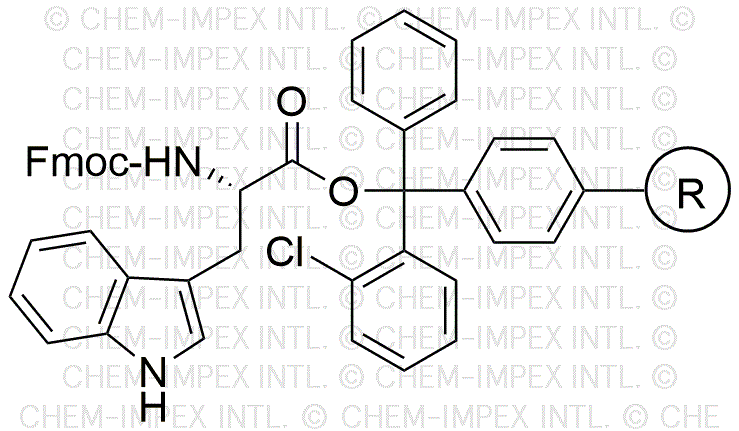Na-Fmoc-L-tryptophan-2-chlorotrityl resin is widely utilized in research focused on
- Peptide Synthesis: This resin is primarily used in solid-phase peptide synthesis, allowing researchers to create complex peptides efficiently. Its ability to anchor amino acids makes it a preferred choice for synthesizing custom peptides for various applications.
- Drug Development: In pharmaceutical research, this resin aids in the development of peptide-based drugs. Its compatibility with automated synthesizers streamlines the process of producing therapeutic peptides, which can lead to quicker drug discovery.
- Biotechnology: The resin is valuable in the biotechnology sector for producing peptides that can be used in diagnostics or as research tools. Its high purity and yield are crucial for obtaining reliable results in experiments.
- Research in Neuroscience: Given that tryptophan is a precursor to serotonin, this resin is used to synthesize peptides that can help study neurotransmitter functions, contributing to advancements in understanding mood disorders.
- Custom Peptide Libraries: Researchers utilize this resin to create diverse peptide libraries for screening purposes. This application is essential in identifying new drug candidates or understanding protein interactions.
General Information
Properties
Safety and Regulations
Applications
Na-Fmoc-L-tryptophan-2-chlorotrityl resin is widely utilized in research focused on
- Peptide Synthesis: This resin is primarily used in solid-phase peptide synthesis, allowing researchers to create complex peptides efficiently. Its ability to anchor amino acids makes it a preferred choice for synthesizing custom peptides for various applications.
- Drug Development: In pharmaceutical research, this resin aids in the development of peptide-based drugs. Its compatibility with automated synthesizers streamlines the process of producing therapeutic peptides, which can lead to quicker drug discovery.
- Biotechnology: The resin is valuable in the biotechnology sector for producing peptides that can be used in diagnostics or as research tools. Its high purity and yield are crucial for obtaining reliable results in experiments.
- Research in Neuroscience: Given that tryptophan is a precursor to serotonin, this resin is used to synthesize peptides that can help study neurotransmitter functions, contributing to advancements in understanding mood disorders.
- Custom Peptide Libraries: Researchers utilize this resin to create diverse peptide libraries for screening purposes. This application is essential in identifying new drug candidates or understanding protein interactions.
Documents
Safety Data Sheets (SDS)
The SDS provides comprehensive safety information on handling, storage, and disposal of the product.
Product Specification (PS)
The PS provides a comprehensive breakdown of the product’s properties, including chemical composition, physical state, purity, and storage requirements. It also details acceptable quality ranges and the product's intended applications.
Certificates of Analysis (COA)
Search for Certificates of Analysis (COA) by entering the products Lot Number. Lot and Batch Numbers can be found on a product’s label following the words ‘Lot’ or ‘Batch’.
Numéro de catalogue
Numéro de lot/série
Certificates Of Origin (COO)
This COO confirms the country where the product was manufactured, and also details the materials and components used in it and whether it is derived from natural, synthetic, or other specific sources. This certificate may be required for customs, trade, and regulatory compliance.
Numéro de catalogue
Numéro de lot/série
Safety Data Sheets (SDS)
The SDS provides comprehensive safety information on handling, storage, and disposal of the product.
DownloadProduct Specification (PS)
The PS provides a comprehensive breakdown of the product’s properties, including chemical composition, physical state, purity, and storage requirements. It also details acceptable quality ranges and the product's intended applications.
DownloadCertificates of Analysis (COA)
Search for Certificates of Analysis (COA) by entering the products Lot Number. Lot and Batch Numbers can be found on a product’s label following the words ‘Lot’ or ‘Batch’.
Numéro de catalogue
Numéro de lot/série
Certificates Of Origin (COO)
This COO confirms the country where the product was manufactured, and also details the materials and components used in it and whether it is derived from natural, synthetic, or other specific sources. This certificate may be required for customs, trade, and regulatory compliance.


